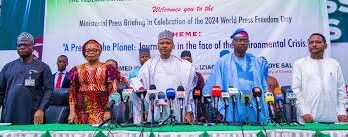Fitch Ratings has affirmed Nigeria’s Long-Term Foreign-Currency Issuer Default Rating (IDR) at ‘B-‘ with a Stable Outlook.
Fitch however said, it expects a somewhat more technocratic, market-friendly, and reformist government under the new president, Bola Tinubu of the ruling All Progressives Congress, who won March’s general election, with 37 per cent of the vote, on a 27 per cent turnout.
On the country’s fundamental strengths and weaknesses, Nigeria’s rating is supported by a favourable public debt/GDP ratio, a large economy, a developed and liquid domestic debt market, and large oil and gas reserves. The rating is constrained by weak governance, security challenges, high inflation, structurally very low non-oil revenue, high hydrocarbon dependence, and weakness in the exchange-rate framework.
The Stable outlook is supported by our base-case expectation of moderate reform progress under the new administration, including the phased elimination of oil subsidies and some more exchange-rate flexibility, although there is sizeable uncertainty around the policy agenda.
Oil production has also picked up from last year’s lows and we think the domestic debt market has sufficient capacity to compensate for severely constrained access to Eurobond financing. However, higher debt servicing costs, and inflationary constraints to continuing deficit monetisation present risks to public finances.
“We expect a somewhat more technocratic, market-friendly, and reformist government under the new president, Bola Tinubu of the ruling All Progressives Congress, who won March’s general election, with 37 per cent of the vote, on a 27 per cent turnout.
“However, significant reform momentum is far from assured given this weak mandate, lack of a majority in the House of Representatives, and social pressures against important reforms.
“We do not anticipate that the numerous legal challenges will lead to the election result being overturned”, said Fitch.
Partial Oil Production Recovery: Oil production (including condensates) fell to a low of 1.1 mbpd in July 2022, averaging 1.5 mbpd for the full year, from 2.1 in 2019, due to oil theft, pipeline vandalism, ageing infrastructure and low investment. Production recovered to 1.6 mbpd in March, helped by resumption of the Forcardos terminal and Trans-Niger pipeline, and a stepping-up of onshore surveillance to tackle theft. Fitch forecasts a further increase to 1.75 mbpd in 2024. There will be a marked increase in refining capacity in 2023 when the Dangote plant commences operations (with an eventual 0.65 mbpd capacity), reducing import costs.
On exchange-rate distortions, there remains extensive use of foreign-exchange (FX) and import restrictions to manage external pressures, with multiple exchange-rate windows at the Central Bank of Nigeria (CBN), and limited flexibility of the main “I&E” rate. This results in severe foreign-currency shortages for the private sector, large divergence with the parallel unofficial exchange rate (N740/$ versus N461/$) and has contributed to weak foreign investment and sizeable private-sector capital outflows over the past year. International reserves fell to USD35.3 billion in April, from USD39.2 billion in July 2022.
Falling International Reserves: Fitch projects the current account balance, which improved 1pp in 2022 to a surplus of 0.2 per cent of Hrpss Domestic Product (GDP), worsens to a deficit of 0.8 per cent of GDP in 2024, on less favourable terms of trade. Together with weak capital inflows, this underpins our forecast for FX reserves to fall to 4.0 months of CXP at end-2024, from 4.9 at end-2022. This is still well above the projected ‘B’ median of 3.3 months, although Fitch estimates around 30 per cent of Nigeria’s reserves are made up of FX swaps. Near-term sovereign external debt service remains manageable, averaging $4.2 billion in 2023-2024.




